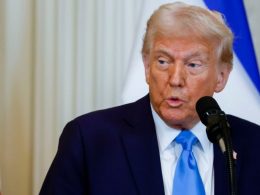I have little doubt that attendance at the “No Kings” anti-Trump protests taking place on Saturday will exceed the previous turnout. The first one, on June 14, which was Donald Trump’s 79th birthday and the day when he staged his enervating military parade, drew an estimated 5mn protesters. Organisers of the second are hoping to double that tally. The greater the volume of Americans taking to the streets, the better their prospects of instilling some hesitancy in Trump’s mind. This may sound like thin gruel amid his remarkable assault on America’s constitutional order. But Trump is obsessed with crowd sizes; a sea of humanity might make him think twice. Given the limits to what marches can achieve, this is a perfectly reasonable theory of the case.
The originator of the “no kings” slogan was the 50501 group, a progressive outfit that stands for “50 protests, 50 states, one movement”. In practice they expect marches in 2,500 towns and cities. That is not nothing. I am also struck by how many non-protesting types are getting behind this rising spirit of protest (“groundswell”, alas, would be too strong a word). Take David Brooks, the New York Times columnist, who was originally hired as a conservative voice on that paper’s liberal-leaning op-ed pages. In an essay for The Atlantic entitled “America needs a mass movement — now”, Brooks approvingly cites Saul Alinsky, the 1960s Chicago radical and arch theorist of civil resistance.
With his five rules of protest, Alinsky laid out the road map for the anti-Trump resistance: “Pick the target, freeze it, personalise it, and polarise it. Another (the fifth) was: Ridicule is man’s most potent weapon.” But Brooks, like me, is sceptical that the No Kings protest will on its own shift the needle. “Conventional politicians don’t have the vision or power to reverse a historical tide,” he writes. “Chuck Schumer is not going to save us . . . large anti-Trump rallies attended exclusively by NPR listeners in blue cities do not impress rural voters.”
To wit, the sponsors of No Kings are almost exclusively progressive — teachers unions, human rights groups, pro-choice advocates and so on. That is all good and well. But it would be considerably more potent were they to add chambers of commerce, veterans associations, entrepreneurs and religious leaders to their ranks.
The No Kings rallies face two additional hurdles. The first, ironically, is that they lack a king. Movements need leadership. America’s most successful civil resistance campaign was led by a king, Martin Luther King. He always had specific goals in mind. At the famous 1965 showdown on Selma’s Edmund Pettis bridge, King’s objective was to provoke the town’s good ‘ol boy police into meting out savagery to peaceful protesters on live TV. The ensuring national outrage would pressure President Lyndon Johnson to pass the Voting Rights Act. King achieved his goal, which was specific, easily graspable and practical. In addition to its loose and decentralised character, “No Kings” lacks an equivalent rationale. Its only clear deliverable is to mess with Trump’s head via sheer scale of numbers.
But tomorrow’s marchers will not be wasting their time. Republicans are clearly worried about the potential optics of Saturday’s protests. Mike Johnson, speaker of the House of Representatives, this week said: “We call it the Hate America rally . . . I bet you’ll see Hamas supporters, I bet you’ll see Antifa types. I bet you’ll see Marxists on full display — people who don’t want to stand and defend the foundational truths of this republic.”
Indeed, Johnson’s “Hate America” phrase has caught on. We should be careful what we wish for. But in the spirit of MLK a heavy-handed police response to peaceful demonstrators would be helpful to the No Kings cause. The point about kings, as Stephen Miller, Trump’s de facto prime minister, keeps reminding us, is that they do what they like. Miller has mused about Trump seizing “plenary authority”. Another word for that is tyranny. Most Americans have not yet grasped what is at stake. I wonder what it would take for them to do so.
I am turning this week to my esteemed colleague Brooke Masters, the FT’s US managing editor. Brooke, you’re based in New York and thus largely unencumbered by Washington DC’s restrictive political lens. How much of the “No Kings” message is breaking through to the general public in your view? Am I too sceptical of its prospects?
Recommended reading
-
In my column this week, I look at the “US-China déjà vu all over again”. The chances that Trump will again fold in his latest bout of brinkmanship with China are high — not least because China’s ability to inflict economic pain on the US is greater for the time being than vice versa.
-
In her always engaging Substack, Fresh Hell, Tina Brown makes a fair assessment of whether Trump is the “real deal” following his dramatic early success in conjuring a ceasefire and hostage return in Gaza. While reviling Trump’s domestic agenda, I concede an upside to his willingness to do what no sane inter-agency process (read Democratic or old-style Republican president) would dare recommend. Next stop Iran, apparently . . .
-
Those wondering about the direction of what Illinois governor JB Pritzker calls the “Do Nothing Democrats” will enjoy this thought provoking essay by Foreign Policy’s Michael Hirsh — “Why the Democrats are so lost”. It is as good a diagnosis as I have seen recently.
-
Finally, I spent much of last week at the excellent and instructive Riga conference in Latvia — a Baltic state on Russia’s borders with ample reason to dread Trump’s unpredictability. While there, I also gave the annual Isaiah Berlin lecture named after one of my intellectual heroes — the great 20th-century liberal British philosopher. Among other timeless essays, Berlin’s one on the hedgehog and the fox is a classic. Swampians with time on their hands can watch my lecture on “Berlin, Brzezinski and the revenge of geopolitics” here.
Brooke Masters responds
I may not be in Washington, Ed, but New York is not the best place to judge the country’s resistance to Trump either. It is hard to tell from this deeply blue state whether Trump’s more belligerent or bizarre moves will really sway the swing state voters who gave him his victory in the 2024 election.
There is some evidence that the Department of Justice’s recent indictments of former FBI director James Comey and New York attorney-general Letitia James have cut through. Recent Pew polling shows that two-thirds of Americans think Trump has improperly used his office to punish people he doesn’t like. Even 42 per cent of Republicans feel this way.
As a veteran of multiple federal government shutdowns, I also think that the longer key services are closed, the more Americans rediscover that they like a lot of things the federal government does — and remember which party is always banging on about how government is useless. Passport offices and national park visitor centres are already closed, and the government on Wednesday briefly tried to pause paying doctors and hospitals for senior care before backing down.
I do not think it is a coincidence that Trump’s approval ratings are under water in all of the key swing states for the first time since he took office in January. That might mean that this weekend’s No Kings rallies really will make a difference. My 80-something mother plans to join in, as do a large number of middle-aged people and much younger acquaintances in my extended social circle.
But as you point out, marches in blue communities and unfavourable opinion polls are not going to make a concrete difference. Votes in the upcoming 2026 midterm elections might, but arguments in a crucial US Supreme Court case this week suggest that the deck is only getting more stacked against Trump’s opponents.
During oral arguments, comments from several conservative justices suggested that the high court is getting ready to further weaken the Voting Rights Act that came out of the 1965 Selma protests. If so, Republican state politicians will be able to cram more minority Democratic voters into fewer congressional districts and therefore capture more seats themselves.
The net result would likely be a larger GOP majority in the House of Representatives that would provide even less of a check on Trump’s power. While oral arguments are not final decisions, the signs are not looking good.
Your feedback
We’d love to hear from you. You can email the team on swampnotes@ft.com, contact Ed on edward.luce@ft.com and Brooke on brooke.masters@ft.com, and follow them on X at @brookemasters and @EdwardGLuce. We may feature an excerpt of your response in the next newsletter
Source link









